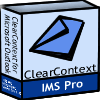I just came across this great article on Jugglezine filled with interesting email overload facts:
 "In 2006, the average corporate e-mail user received 126 e-mail messages
"In 2006, the average corporate e-mail user received 126 e-mail messages
per day, a 55 percent increase since 2003, according to a survey
by The Radicati Group, Inc., a technology market research firm in Palo
Alto, California. "If users spend an average of one minute to read and
respond to each message, this flood of e-mail traffic will consume more
than a quarter of the typical eight-hour workday–with no guarantee
that users actually read the messages that are most important," the
report said. "Additionally, if e-mail traffic continues to increase at
this rate, the average corporate e-mail user will spend 41 percent of
the workday managing e-mail messages in 2009."
The article also has a wealth of tips for "seizing control of email." Check it out.
Posted by brad at 9:43 pm on October 25th, 2007.
Categories: email.
We’re heads down on the new release here, but I wanted to take a quick moment to point you to some of the interesting articles I’ve come across the last few days:
WSJ: Will Social Features Make Email Sexy Again?
“Email providers are trying to steal some of social networking’s thunder as fast-growing services like Facebook Inc. begin to encroach on their turf.” (Deva’s got some comments on this one).
Alternate Layers: Workplace Attention Economy
“Email Free Friday is a downright silly idea, but is a sign that there is a greater disease.” (It looks like Thomas has the same opinion as me regarding Free Email Day).
Bex Huff: Email Free Fridays
I found Ben’s admittedly aggressive solution to email overload from the article above. His suggested automated response to email: “I’m currently swamped with projects X, Y, and Z at the moment. If I answer your email, one of them will suffer. Please let me know which one should suffer, let me inform the project manager that it will suffer because of you, and then I’ll be happy to answer your question.“
CNET: Gates has a long to-do list
“Others at the company say that Gates is particularly driven about the notion of how presence–the notion of a computer knowing whether someone is online or not–can be used by computers to help prioritize work.” OK, so this is tangentially related to email, but I found the comments regarding presence and prioritization to be pretty interesting for reasons that I’m sure you can guess.
Enjoy.
Posted by brad at 5:55 pm on October 18th, 2007.
Categories: email.
 Our friend Robert Scoble weighs in on the future of email in the BusinessWeek Debate Room on a piece titled Email Faces Deletion; his premise being that “e-mail isn’t a good way to share knowledge.” ClearContext CEO Deva Hazarika has posted his rebuttal of Robert’s points on his newly revitalized blog, Email Dashboard. Check it out.
Our friend Robert Scoble weighs in on the future of email in the BusinessWeek Debate Room on a piece titled Email Faces Deletion; his premise being that “e-mail isn’t a good way to share knowledge.” ClearContext CEO Deva Hazarika has posted his rebuttal of Robert’s points on his newly revitalized blog, Email Dashboard. Check it out.
Posted by brad at 4:33 pm on October 13th, 2007.
Categories: Uncategorized.
 “Free email day” makes me sad.
“Free email day” makes me sad.
The WSJ posts about companies who designate “Free Email Days” for their organization – entire days where employees are forbidden from using email to get their work done:
“While the bans typically allow emailing clients and customers or responding to urgent matters, the normal flow of routine internal email is halted. Violators are hit with token fines, or just called out by the boss.
The limits aim to encourage more face-to-face and phone contact with customers and co-workers, raise productivity or just give employees a reprieve from the ever-rising email tide.”
If you’re a reader of this blog then you likely already understand the issues that too much email presents. From a USA Today article on the same subject, Fridays go from casual to e-mail-free:
“E-mail overload is caused by the sheer volume of messages zipping around the globe. Each day, about 39.7 billion person-to-person e-mails, 17.1 billion automated alerts, and 40.5 billion pieces of spam (unsolicited commercial e-mail) are sent worldwide, researcher IDC says. White-collar workers often receive 140 messages a day, executive coach Marsha Egan says.”
But honestly, free email day sounds a bit like the ostrich putting his head in the sand. It’s like admitting that bad email management is sapping your employee’s productivity, but rather than addressing the issue you’re OK with them being completely unproductive 4 days out of the week. Hey, at least your organization gets some work done on Fridays!
I have said it time and again, if you aren’t efficiently managing your email, you aren’t being fair to your customers, your co-workers, or yourself. These companies need to be putting their efforts into giving their employees the tools they need to effectively manage the flow of information. And I’m not ranting because I want everyone to buy site licenses to our product (but you should!); teach your employees how to identify what’s important in email, how to efficiently manage those messages and how to succeed at their jobs rather than putting arbitrary restraints on their workflow because they can’t focus on the task at hand. The result will be happier co-workers, satisfied customers and a more productive, creative work environment.
 And I won’t be sad anymore.
And I won’t be sad anymore.
Posted by brad at 2:44 pm on October 12th, 2007.
Categories: Uncategorized.
 We’re getting close to final release of the next version of IMS Pro. Those of you who have previously contacted us about the beta program will be hearing from us soon. We’re keeping details on new functionality under wraps for now, but there’s a lot of exciting new stuff in this release. We’re expanding our current group of beta testers, so if you’re interested in participating in our private beta (participants must agree to keep information about the release confidential until launch) to get an early preview of all of the new functionality, please send an email to beta@clearcontext.com and we will get back to you with more information. Thanks for your assistance – we’re really excited to show you what’s coming and hear your feedback!
We’re getting close to final release of the next version of IMS Pro. Those of you who have previously contacted us about the beta program will be hearing from us soon. We’re keeping details on new functionality under wraps for now, but there’s a lot of exciting new stuff in this release. We’re expanding our current group of beta testers, so if you’re interested in participating in our private beta (participants must agree to keep information about the release confidential until launch) to get an early preview of all of the new functionality, please send an email to beta@clearcontext.com and we will get back to you with more information. Thanks for your assistance – we’re really excited to show you what’s coming and hear your feedback!
Posted by brad at 7:02 pm on October 10th, 2007.
Categories: Uncategorized.
Cory Doctorow of Boing Boing fame has written an interesting article titled “The Future of Ignoring Things” for Internet Evolution. His basic premise – computers have done such a good job of helping us remember things that now we need to put them to work on helping us to ignore. In particular, he talks about about implementing an email feature reminiscent of the Unsubscribe function in IMS Pro:
“Rael Dornfest, the former chairman of the O’Reilly Emerging Tech conference and founder of the startup AskSandy, once proposed an “ignore thread” feature for mailers: Flag a thread as uninteresting, and your mailer will start to hide messages with that subject-line or thread-ID for a week, unless those messages contain your name. The problem is that threads mutate. Last week’s dinner plans become this week’s discussion of next year’s group holiday. If the thread is still going after a week, the messages flow back into your inbox — and a single click takes you back through all the messages you missed.
We need a million measures like this, adaptive systems that create a gray zone between “delete on sight” and “show this to me right away.”
This type of strategy is necessary due to the huge volume and high cost of interruptions; well documented in Intel’s analysis of the impact of Informania. At ClearContext we continue to focus our core products and energies on eliminating this issue and “showing people the right way.”
Posted by brad at 3:09 pm on October 3rd, 2007.
Categories: infomania.
"In 2006, the average corporate e-mail user received 126 e-mail messages
 Our friend
Our friend  We’re getting close to final release of the next version of
We’re getting close to final release of the next version of